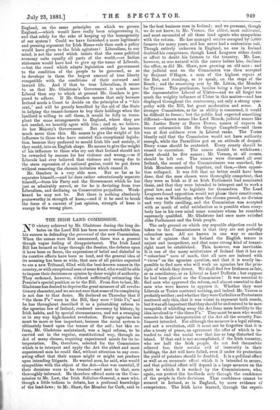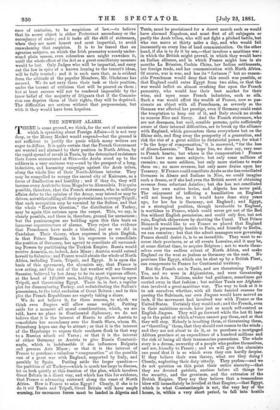THE IRISH LAND COMMISSION.
NO victory achieved by Mr. Gladstone during the long de- bates on the Land Bill has been more remarkable than his success in defending the personnel of the new Commission. When the names were first announced, there was a general though vague feeling of disappointment. The Irish Land Bill has loomed so large through the Session, the debates upon it have been so fierce, the expressions of belief and disbelief in its curative effects have been so loud, and the general idea of its meaning has been so wide, that men of all parties expected to see a new Tribunal, filled with the best-known names in the country, or with exceptional men of some kind, who would be able to impose their decisions on opinion by sheer weight of authority. They reckoned, however, without sufficiently estimating the Premier's special position as to the Bill. From first to last, Mr. Gladstone has desired to deprive the great measure of all revolu- tionary character, and we are not sure that some of its complexity is not due to that desire. He declared on Thursday that if "the three F's" were in the Bill, they were "little f's," and he has throughout described it as a painstaking reform in the agrarian law of Ireland, rendered necessary by history, by Irish habits, and by special circumstances, and not a sweeping or in any way high-handed revolution. Every agrarian law must be more or less important, because the social system is ultimately based upon the tenure of the soil ; but this re- form, Mr. Gladstone maintained, was a legal reform, to be carried out in the regular, constitutional way, through an Act of many clauses, requiring experienced minds for its in- terpretation. He, therefore, selected for the Commission which is to interpret and apply the Act the ablest and most experienced men he could find, without attention to any over- awing effect that their names might or might not produce upon intending litigants. He wanted men, he said, who would sympathise with the object of the Act—that was essential, if their decisions were to be trusted—and next to that, men thoroughly informed. He therefore offered seats on the Com- mission to Mr. Law, the Irish Solicitor-General, a man who. though a little tedious in debate, has a profound knowledge of the land-laws ; to Mr., Shaw, the Member for Cork, said to
be the best business man in Ireland ; and we presume, though we do not know, to Mr. Vernon, the ablest, most cultivated, and most successful of all those land agents who sympathise with the reform. He has managed estates occupied by' 5,000 farmers for many years, and has never had a contentious suit. Though entirely unknown in England, no one in Ireland doubted his competence, though Land Leaguers either doubt or affect to doubt his fairness to the tenantry. Mr. Law, however, as was natural with the career before him, declined the office, as did Mr. Shaw, now growing an old man ; and the judicial seat on the Commission was then accepted by Serjeant O'Hagan, a man of the highest repute at the Bar, and standing, so to speak, on the steps of the Bench ; and the remaining seat by Mr. Litton, the Member for Tyrone. This gentleman, besides being a ripe lawyer, is the representative Liberal of Ulster—and we all forget too much the weighty influence of Ulster in this matter—and has displayed throughout the controversy, not only a strong sym- pathy with the Bill, but great moderation and sense. A stronger Commission, as far as ability is concerned, it would be difficult to frame ; but the public had expected something different—known names like Lord Monck, judicial names like Mr. Justice Barry or Baron Dowse, names of experts in tenure reformation like Sir George Campbell—and there was at first coldness even in Liberal ranks. The Tories bluntly said that the Commission would not have authority enough, while the Parnellites put on an attitude of despair. Every name should be contested. Every county should be roused to execration. The names should be withdrawn ; there should be five names ; Mr. Vernon, at all events, should be left out. The names were discussed all over Ireland, the record of the Commissioners was searched, the Irish Members consulted together, and then,—then opposi- tion collapsed. It was felt that no better could have been done, that the men chosen were thoroughly competent, that they were as Irish as if an Irish Parliament bad nominated them, and that they were intended to interpret and to work a great law, and not to legislate for themselves. The Land Leaguers found opposition would not please their constituents, there was on Wednesday, when the clauses passed, no division and very little cavilling, and the Commission was accepted with as much of solid satisfaction as is possible when every- body has in his own mind some nominee whom he considers. supremely qualified. Mr. Gladstone had once more satisfied alike Parliament and the Irish people.
The only ground on which any arguable objection could be taken to the Commissioners is that they are not perfectly colourless men. All are known in one way or another to be of opinion that in Ireland the English tenure is unjust and inexpedient, and that some strong kind of tenant- right must be established. This, however, was inevitable. It is one of the many misfortunes of Ireland that it has no " colourless " men of mark, that all men are imbued with " views " on the agrarian question, and that it is nearly im- possible to find men who will work an agrarian law the prin- ciple of which they detest. We shall find few Irishmen as fair, or as conciliatory, or as Liberal as Lord Dufferin ; but suppose he had been placed on the Commission ! It was essential to. find men who approved the reform, and almost essential to find men who were known to approve it. Whether they were Liberals or Tories mattered nothing, and indeed Mr. Vernon is probably neither; and whether they were Catholics or Protestants mattered only this, that it was wisest to represent both creeds, but it was all-important that they should be understood to be men incapable of whittling away the Act from mere hostility to the idea involved in" the three F's." They must be men who would concede in their interpretation of the Act all the security Par- liament intended. For although the measure is a legal reform,. and not a revolution, still it must not be forgotten that it is also a treaty of peace, an agreement the offer of which is in- tended to end the social war that has so long disturbed the island. If that end is not accomplished, if the Irish tenantry, who are half the Irish people, do not feel themselves relieved fom their secular evil of insecurity in their holdings, the Act will have failed, even if under its protection the yield of potatoes should be doubled. It is a political effect as well as an economic effect which it is intended to secure, and that political effect will depend in a large measure on the spirit in which it is worked by the Commissioners, who, again, can protect the landlords only through the confidence of the people in their decisions. That confidence cannot be secured in Ireland, as in England, by mere evidence of competence. The Irish have learned, through the experi- ence of centuries, to be suspicious of law,—to believe that its secret object is either Protestant ascendancy or the ascendancy of caste ; and it tasks all the skill of statesmen, when they are most honest and most impartial, to avoid reawakening that suspicion. It is to be feared that on agrarian subjects, on which the Irish peasantry scarcely under- stand plain reason, even colourless men might reawaken it, until the whole effect of the Act as a great conciliatory measure would be lost. Only Judges who will be impartial, and carry out the law in spite of a known leaning to the tenant's ideas, will be fully trusted ; and it is such men that, as is evident from the attitude of the popular Members, Mr. Gladstone has secured. We do not envy them their task or their position, under the torrent of criticism that will be poured on them ; but at least success will not be rendered impossible by the inner belief of the majority of litigants that if the Commis- sion can deprive them of their rights, they will be deprived. The difficulties are serious without that prepossession, but with it they would have been hopeless.



































 Previous page
Previous page